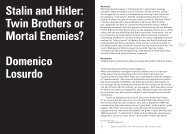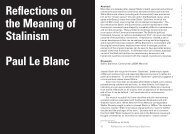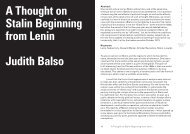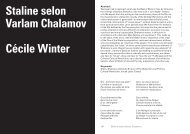adrian
adrian
adrian
- No tags were found...
You also want an ePaper? Increase the reach of your titles
YUMPU automatically turns print PDFs into web optimized ePapers that Google loves.
large portions of the Phenomenology and Philosophy of Mind are putforward as possessing at least a relative autonomy vis-à-vis their sociohistoricalcatalysts and influences, with these portions’ validity notsimply rising and falling with the waxing and waning of given contextualcircumstances.Two fundamental questions are at stake in Žižek’s recentdisagreements with Pippin (and similar deflationists) over the non/antimetaphysicalHegel: First, what is the true nature of beginning(s) forHegel’s philosophical framework? Second, how and why, in the currentaftermath of deflationary variants of Hegelianism (especially Pippin’sKantianizing one), is anybody entitled to put forward a historical/dialectical materialist Hegel? As seen, I answer the first questiondifferently than Žižek does. Whereas he locates a single Ur-beginningin the Logic’s “Doctrine of Being” (more precisely, in “DeterminateBeing”/“Being-There” as preceded by the triad of Being-Nothing-Becoming) and Pippin does so within “The Doctrine of the Concept,” Itreat the Logic in toto as only one of three different yet equiprimordialbeginnings, that is, as a metaphysical beginning distinct from equallyindispensable material (as per Naturphilosophie) and historical (asper Geistesphilosophie) ones too. Furthermore, this move of mine,particularly by virtue of it restoring to Hegel’s Realphilosophie equalstanding with respect to Logik within his System as a whole, answersthe second question by inverting it: How and why, in taking seriouslyHegel’s thoughts and texts, is anybody entitled to put forward an antimaterialist,anti-naturalist, and/or anti-realist (in a word, deflated)Hegel? In Less Than Nothing as well as throughout his still-unfoldingoeuvre, Žižek indeed reads Hegel in this same spirit, clearly consideringthe material/natural and historical/mental Philosophy of the Real to beas essential to Hegel’s philosophy as the Logic. However, not only doesthis exegetical approach require the sort of additional argumentativeand textual support I have tried to provide in this intervention—someof Žižek’s interpretive maneuvers with respect to Hegel (such as thebeginning he claims to find in “The Doctrine of Being”) are at odds witha globally consistent overall reading Hegel’s System as a historical/dialectical materialism avant la lettre. As seen at the start of this essay,Žižek, immediately after claiming in Less Than Nothing that Hegel’sSystem initially gets underway quite early in the Logic with the Beingthereof Determinate Being, claims that there is a properly Hegelianmaterialist ontology. One thing I think I have managed to show here isthat these two claims are in tension with each other and that Žižek wouldCRISIS&CRITIQUE#3be well advised to drop the former claim if he wants to hold onto thelatter.Deflationists might respond to all of the preceding by appealingto a distinction between historically accurate readings versusphilosophically interesting reconstructions, identifying themselvesas pursuing projects of the latter type. With this line of response, it iseither assumed or asserted that much of the actual, factual Hegel of yore(for instance, the grand system-builder, the ambitious metaphysician,and the philosopher of nature) long ago ceased to be alive, relevant, orvalid for later generations of readers and thinkers. Such deflationiststake it for granted that the various and sundry post-metaphysical turnsin the Continental and/or Analytic philosophical traditions are (or, atleast, should be) assumed to be historical points of no return markinga trajectory of presumed intellectual development (or even progress);in this, they are neither sufficiently (self-)critical nor philosophicallyinteresting. For them, the key questions are: Where does Hegel standwith respect to the present? What remains interesting or palatable inHegel’s philosophy judged by today’s philosophical criteria and tastes?But, for anyone risking the encounter of a true engagement with a giantof the philosophical past such as Hegel (as a past which, echoingWilliam Faulkner, is never even past) with as few (usually anachronistic)presuppositions as possible, the key questions always (also) are:Where does the present stand with respect to Hegel (or whichevermember of the pantheon of the “mighty dead”)? How would Hegel(or any other philosopher of the never-even-past past) judge today’sphilosophical criteria and tastes? That is to say, recognizing Hegel (oranyone else) as truly worthy of sustained attention in the present, as aninterlocutor irreplaceable by other recent or current thinkers, ought toentail those conferring this recognition being willing and able to havetheir very present itself called into question and challenged by the objectof this recognition. This amounts to a reversal of Žižek’s question“Is it still possible to be a Hegelian today?”: Is it still possible to becontemporary (i.e., to presume as well-founded today’s establishedstandards for judging Hegel’s enduring value or lack thereof) in the faceof an honest, thorough reckoning with Hegel himself in all his gloriousphilosophical untimeliness? Anything short of this reckoning signalsa disrespectful underestimation throwing the doors wide open to thesurreptitious replacement of Hegel with the ersatz of a dummy made forexploitation by post-Hegelian ventriloquists.CRISIS&CRITIQUE#3410 “Where to Start?: Robert Pippin, Slavoj Žižek...411“Where to Start?: Robert Pippin, Slavoj Žižek...






